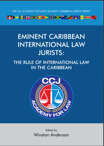Faculty of Law


In 2018, the United Nations International Law Commission adopted Draft Conclusions on the Identification of Customary International Law. These conclusions have been presented to the United Nations General Assembly and are to be disseminated among States and other entities in the international arena.
The work of the International Law Commission provides the backdrop for the reflections on customary international law offered by Professor Vasciannie. Among other things,
Vasciannie’s article examines the status of customary law among the sources of international law listed in the Statute of the International Court of Justice, reviews the two main elements associated with the formation of custom (State practice and opinio juris), and considers particular aspects of custom as discussed by the International Law Commission.
In assessing the status of customary law among the other sources of international law, the article follows the main authorities on the subject in the suggestion that custom and treaties are to be regarded as items atop the hierarchy of sources. It also considers the special importance of custom in States which automatically incorporate customary law into their domestic legal systems. As to the Caribbean, Vasciannie leaves open the question whether customary rules are automatically a part of municipal law, but argues, nonetheless, that these rules have a significant impact on State behaviour.
In its review of the two main elements of custom, the article reiterates the idea that State practice alone -- however consistent, uniform and substantial -- does not give rise to rules of custom. Rather, in each case, a State wishing to prove the existence of a custom also needs to demonstrate opinio juris: the State must show that other countries recognize the practice in question as a part of international law.
As far as particular questions are concerned, the article discusses whether the practice of international organizations is tantamount to State practice, identifies challenges that may be made by postcolonial States to the doctrine of persistent objection, and accepts that small groups of States, and even two States, may develop rules of practice applicable only to themselves.
The article closes with a brief review of how the elements of custom identified by the International Law Commission may be applied to two matters of direct interest to Caribbean States, namely, the legal status of the deep seabed, and the question whether rules in bilateral investment treaties have become a part of customary law. These matters have been, and continue to be, subjects of controversy in international law.